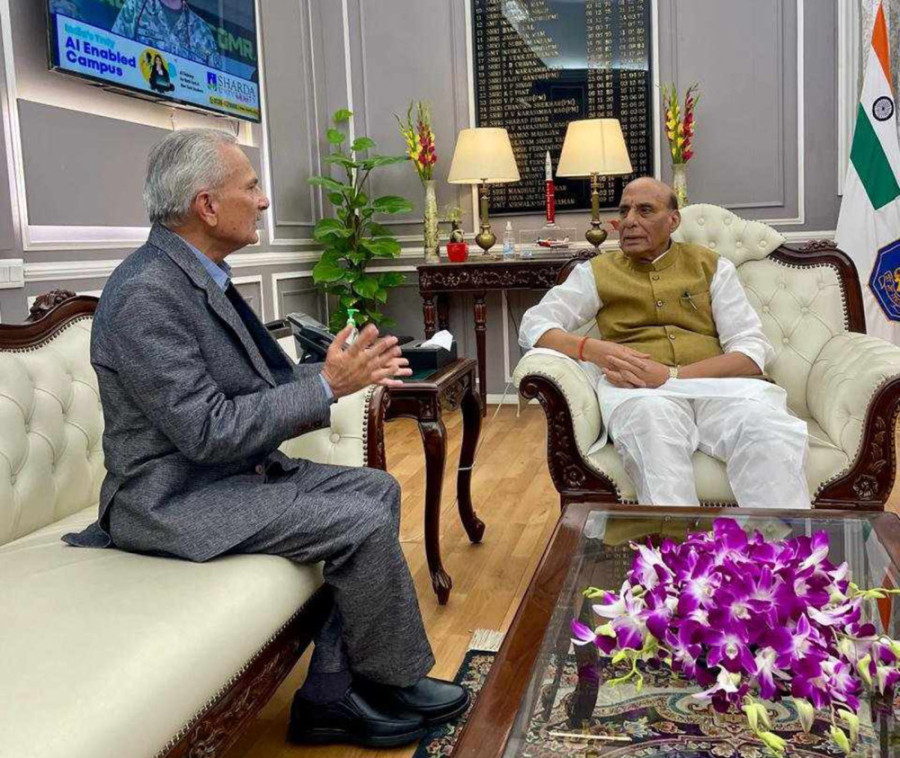Politics
India favours current political system in Nepal: Ex-PM Bhattarai
The Indian side has concluded that EPG failed to fulfil its task, so both sides need to find a new way, Bhattarai says.
Post Report
India is in favour of the current political system in Nepal, former Prime Minister Baburam Bhattarai has said. Bhattarai’s statement comes at a time when certain sections in Nepal are accusing India for the recent surge of anti-republican and anti-secular demonstrations.
“I found that India is not in favour of reversing the present political course in Nepal,” Bhattarai told reporters at Tribhuvan International Airport on Tuesday upon his return to Kathmandu after meeting with several Indian leaders, diplomats and experts during his visit to the southern neighbour.
During his stay in India, Bhattarai held talks with India’s Defence Minister Rajnath Singh, former Indian ambassadors to Nepal Shyam Sharan, Rakesh Sood, Ranjit Rae, and Manjeev Singh Puri, and several other leaders and experts.
“The Indian government and major Indian forces keeping a tab on Nepal’s affairs are against a regime change in the country,” Bhattarai said. “Some regressive forces are creating some illusions and protesting against the present system. But I found that India is not in favour of regime change. Since India was not in favour of regime change, I am happy and satisfied.”
Since pro-Hindu and pro-monarchy protesters have intensified protest and demonstrations in Nepal of late. While some have accused an Indian hand behind such activities, several Indian leaders and officials including External Affairs Minister of India S Jaishankar, among others, have ruled that out.
“In India, at the public level, there was a widespread concern that the several demonstrations and protests in Nepal were directed against the present political system,” Bhattarai said. “Some Indians might be behind some of those protests and agitation but the government of India and major Indian political forces are not involved in inciting the regressive activities in Nepal.”
Several Indian experts, religious leaders and media have been exagerrating the recent pro-Hindu and pro–monarchy protests in Nepal and extending direct and indirect support to those movements through various means.
Bhattarai also discussed the report of the Eminent Persons’ Group on Nepal-India relations.
“The Indian side has concluded that EPG failed to fulfill its task, so both sides needed to find a new way,” Bhattarai said.
The EPG is Bhattarai’s brainchild. In 2016, Nepal and India had formed an eight-member panel of “eminent persons” from both countries to review bilateral relations in their entirety and suggest the way forward.
The peace and friendship treaty of 1950, which Nepal claims is unequal, was among the issues taken up in the panel’s deliberations. The group prepared a joint report in July 2018 but has failed to submit it to the authorities after the Indian side’s reluctance to receive it. The committee led by Bhekh Bahadur Thapa from Nepal side and Bhagat Singh Koshiyari from India was constituted as per an agreement between the then prime minister KP Sharma Oli and his Indian counterpart, Narendra Modi.
“India is positive towards resolving the outstanding issues through the new method,” Bhattarai said.
Ending the differences and disputes between the two countries requires a prime minister-level talk, Bhattarai suggested.
“In my talks with India’s Defence Minister Rajnath Singh, we discussed and agreed that in order to resolve the differences existing between us, we must hold talks at the prime minister-level,” said Bhattarai.
“I urged him [Singh] to send the same message to prime minister Modi. Indian highest political level seemed convinced that EPG could not work as expected—this is what my conclusion is. Before leaving for India, I spoke with the coordinators of both sides too.”
Former minister and ambassador Bhekh Bahadur Thapa and former Governor Bhagat Singh Koshiyari led the EPG panel that was entrusted to recommend and suggest the new blueprint of Nepal-India relations in the changed context.
“I had a sincere talk with Bhagat Singh Koshiyari,” Bhattarai said. “He was also in a position to find another solution.”
The only solution between us is talks and we should resolve all outstanding issues through dialogue, he added.
Bhattarai added that the only way to resolve outstanding issues between the two countries is through dialogue. “There is no advantage to us if we can’t resolve the differences with India,” he said. “Some other issues can be resolved later but those related to the effects of open borders on our economy and other sectors can be discussed and resolved now.”




 16.12°C Kathmandu
16.12°C Kathmandu














